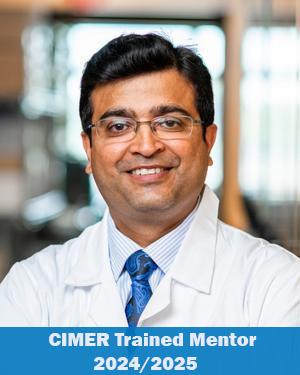Research News
04/03/2020
Interrogating a Novel Mechanism of Kidney Cancer Cell Metabolism
Dr. Chakraborty will study one candidate oncogene’s contributions to kidney cancer, looking specifically at the role it may play in cancer cell metabolism, thanks to a new award from the Department of Defense, his first federal research grant.

The Department of Cancer Biology’s Abhishek Chakraborty, PhD, Assistant Staff, and the Genitourinary Malignancy Research Center’s newest recruit, has received a four-year, just over $1 million Early-Career Investigator Award as part of the Department of Defense’s Kidney Cancer Research Program.
This award, Dr. Chakraborty’s first federal grant—a major milestone in every biomedical researcher’s career—will support his ongoing investigations into kidney cancer cell metabolism.
Building on earlier work from his postdoctoral fellowship
During Dr. Chakraborty’s time working as a postdoc in the laboratory of Nobel Prize winner William Kaelin, Jr., MD, at Dana-Farber Cancer Institute, he used genomics analysis to identify about 100 genes that are aberrantly “turned on” in renal cancer cells. The faulty expression of these genes, he and collaborators found, occurred because of changes in the way the cancer cell’s DNA is organized—normally tightly wrapped up like a spool of thread.
After using genetic screening tools in preclinical models of kidney cancer to uncover the downstream effects of the identified “candidate oncogenes,” Dr. Chakraborty found one protein to be particularly important. With the Early-Career Investigator Award, he will continue his studies into the mechanisms that may link elevated levels of this protein to kidney cancer onset and progression.
Investigating one protein’s role in kidney cancer
Under normal conditions, the protein under study, which is found on the surface of kidney cells, binds and absorbs amino acids that would otherwise be excreted in urine. Importantly, though, the same amino acids this protein helps absorb are also known to help sustain cancer cells.
Dr. Chakraborty’s earlier studies suggest that activation of the protein’s coding gene somehow hijacks the normally helpful nutrient absorption process and instead turns it into a source of fuel for the machinery inside of cancer cells that enables them to grow and spread.
“Thanks to this support from the Department of Defense, my lab will be able to investigate how blocking this protein affects kidney cancer development and progression,” Dr. Chakraborty commented, “with the ultimate hope that it may one day serve as a novel therapeutic target.”
Additionally, he and his team will also continue to investigate the effects of the nearly 100 other candidates that he previously found to be related to faulty DNA spooling.
The road to independence
If joining the Cleveland Clinic Genitourinary Malignancies Research Center marked Dr. Chakraborty’s transition to independence, receiving this Early-Career Investigator Award solidifies it.
“I have been so fortunate to train and be educated at some of the top institutions—both here in the United States and in India where I am originally from—as well as to be mentored by some real giants in the field. I am excited to carry on this tradition as I begin to expand my own lab and embark on this project.”
Featured Experts
News Category
Related News
Research areas
Want To Support Ground-Breaking Research at Cleveland Clinic?
Discover how you can help Cleveland Clinic save lives and continue to lead the transformation of healthcare.
Give to Cleveland Clinic